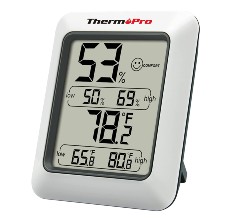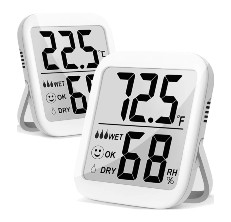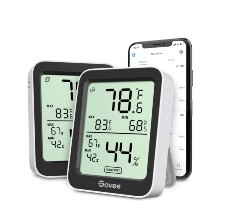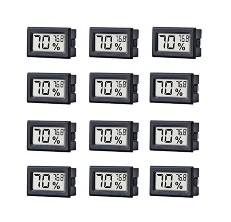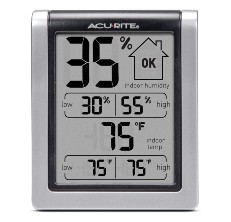Have you ever wanted to measure the humidity levels in your home? You can do this easily with the help of a hygrometer. Many people purchase humidity meters to monitor air quality for health reasons, but no matter why you need a hygrometer, you’re in the right place! Our favorite device is the ThermoPro TP50 Digital Hygrometer, but we also have a list of the best hygrometers on the market. Feel free to explore your options, and don’t forget to check out our buying guide.
Our Top Picks For Hygrometers
The Best Hygrometer: A Buying Guide
What Is a Hygrometer?
A hygrometer is an instrument used to measure the humidity — or the amount of moisture — in relation to the relative humidity. The humidity readings help people determine the ambient temperature. Hygrometers are used in meteorological science settings to calculate weather conditions, inside of galleries to protect artwork, and within everyday homes to ensure the best air quality all around.
There are many different types of hygrometers. For starters, a mechanical hygrometer measures the contraction and expansion of organic matter that will automatically react to more or less humidity. As an example, human hair contracts when it is humid, resulting in what you know as “frizz.”
On the other hand, electrical hygrometers use lithium chloride to measure lithium’s electrical resistance as the humidity changes.
Other hygrometers sense changes in the volume, the weight, or the transparency of various materials that react to humidity.
Things to Consider When Choosing the Best Hygrometer
Before buying a hygrometer, it can be helpful to understand what specifications or features to look for. When you go into the shopping experience prepared, you will save time because you won’t have to browse every hygrometer on the market. Plus, you’ll save money by not buying a hygrometer that has features you won’t ever use. Check out our recommendations of what to consider below.
Outdoor or indoor
Outdoor hygrometers are made for use outside. They are more weather-resistant and durable than indoor hygrometers. Choose the right option based on where you plan to use the humidity meter.
Soil
If you want to measure the moisture in the soil, you should buy a soil hygrometer. These are specifically designed to monitor humidity levels in the soil instead of the air.
LCD digital display
Would you prefer a device with an LCD screen or a needle? LCD displays offer a digital reading while needles are associated with an analog readings, so keep this in mind as you decide.
Records
If you need to record changes in humidity, opt for a hygrometer that records data at intervals that you get to program. For instance, some devices will let you record the humidity every hour. On the other hand, there are hygrometers that monitor findings within seconds.
Accuracy
If you do not need 100% accurate readings, you can save yourself money by purchasing a humidity monitor with a 5% margin of error. If you need total accuracy, you can spend more to obtain a device with perfect accuracy.
Sensor probe
If you want to monitor the humidity of multiple locations, buy a humidity meter with a sensor probe if not multiple sensors. Make sure it comes with a console sensor as well. That way, you can cover more ground.
Portability
A portable hygrometer is useful for quick readings if you are on the go or away from home. For instance, portable hygrometers are great if you go camping often.
Alerts
Do you want a device that alerts you when the humidity levels have changed? What about notifications when the humidity levels surpass your preferred parameters? If this is what you would like, search for hygrometers with alert systems.
Power source
It is important to make sure that the hygrometer you choose is compatible with the power sources in the location where you want to place the device if the device requires an electricity source. If it requires batteries instead, then this detail is less important.
Wi-Fi
If you want to buy a device that alerts you when humidity levels change, you’ll need a hygrometer that connects to Wi-Fi sources. Make sure the Wi-Fi can reach far enough to connect to the location of your hygrometer.
Thermometer
Would you like your humidity meter to detect temperature levels as well? If so, you might want to buy a hygrometer that doubles as a temperature reader. This feature does not usually cost extra money.
How We Choose the Best Hygrometers
When choosing the best hygrometers, we base our decisions on the accuracy of the humidity meters. We also consider extra features, customer reviews, and the value in exchange for the price.
Hygrometers Price Range
A hygrometer can cost as little as $2 and as much as $1,400. The lower end of the price spectrum mostly pertains to soil hygrometers while the more expensive end of the scale is for hygrometers with additional features.
People Also Asked
Where in my home should I place a hygrometer?
When choosing where to place a hygrometer in your home, you should position it at the top of your house. Just make sure it is kept away from any doors or windows. This will ensure that you receive the most accurate humidity readings in your house because the calculations will not be affected by any external elements, including rain, wind, sunlight, and snow.
What is a healthy humidity level?
A healthy humidity level is somewhere between 30% and 50%. At these levels, people feel most comfortable. Your lungs and your skin will thank you!
How can I tell my hygrometer is accurate?
To ensure that your hygrometer is working properly, wrap the hygrometer in a damp towel for 30 to 45 minutes. Then, quickly unwrap the device and look at the humidity reading. A perfectly calibrated hygrometer will state that the humidity levels are at 100%. However, unfortunately, most hygrometers are not completely accurate, so it might read between 80% and 90% instead.




